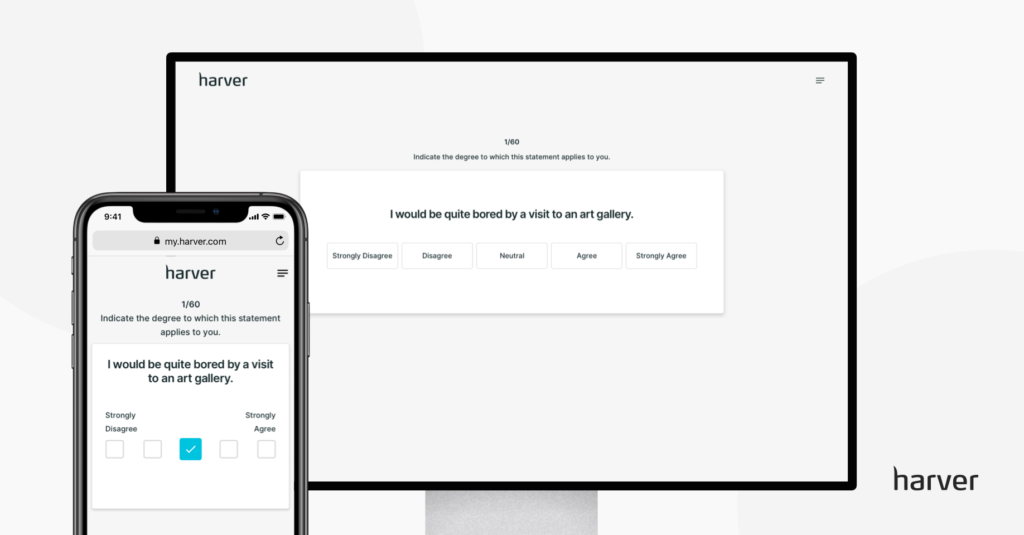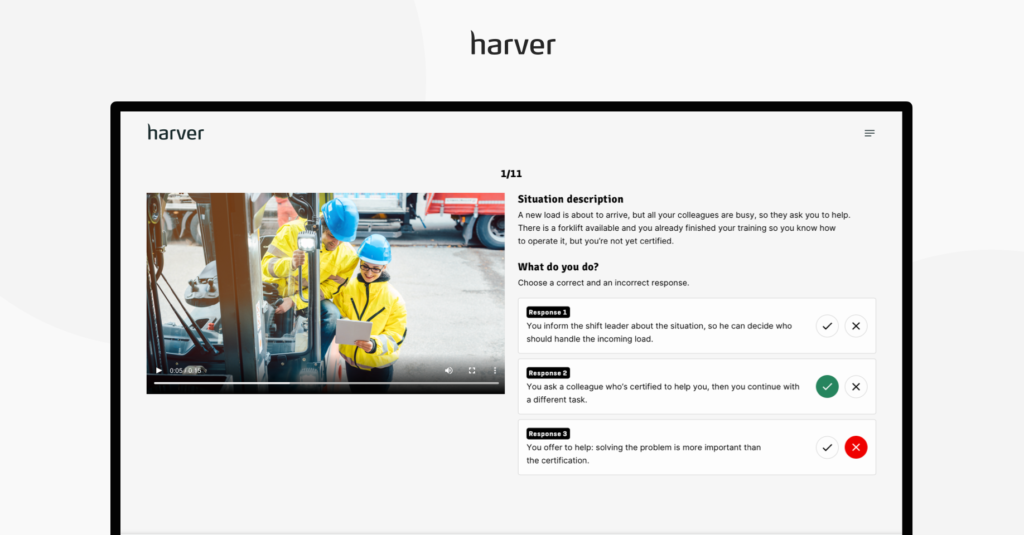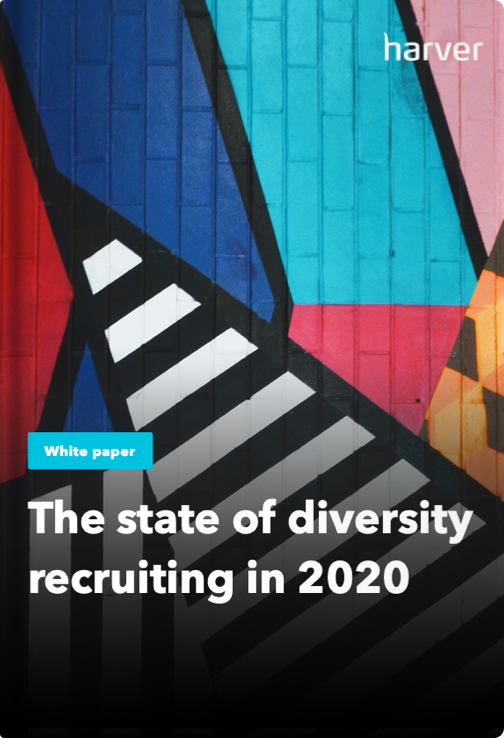The role of personality questionnaires in recruitment is not to tell you “more about the person” so that you can then use your gut to make a hiring decision that’s highly subjective.
Instead, they’re supposed to show you if a candidate has the necessary skills and characteristics to carry out the role successfully, if they are suitable in relation to your company culture, and if they possess the requisite motivations.
To that end, you shouldn’t just pick any personality questionnaire and throw it into the job application process. Instead, the questions should be created or selected with your specific role in mind.
So let’s dive into the topic and see 10 do’s and don’ts of using personality questionnaires in volume recruitment.
What’s in?
Like what you see?
Don’t miss out. Subscribe to our quarterly digest to get the latest TA and TM resources delivered right to your inbox.
1. DON’T use generic personality questionnaires
According to HBR, the use of personality questionnaires in hiring is increasing annually roughly 20%. While they can seem highly insightful, using a random personality questionnaire to assess your candidates has multiple shortcomings.
If your chosen questionnaire isn’t psychometrically validated for hiring and selection, it can lead you to make poor hiring decisions, because you aren’t assessing applicants for the specific desirable characteristics and traits your organization needs from employees.
Out-of-the-box questionnaires are often too generic, giving results that could apply to a number of organizations, not specifically yours. Neither are the results reliable because can all too easily be manipulated or misinterpreted, giving the administrator the data they’re looking for.
Also, many questionnaires are designed to measure a candidate’s emotional ‘states’, as opposed to assessing them for desirable (stable) personality traits. How can you accurately assess an applicant’s potential future job performance if you’re measuring something that is likely going to change over time? We don’t routinely change who we are, but we do regularly experience different mood states.
When you’re using a personality questionnaire in volume recruitment, you need to take a step back and ask whether the test is predictive of future job performance.

2. DO perform a job task analysis
A job task analysis studies the job function and cultural context to determine the factors that influence performance in a specific role. At Harver, this analysis is conducted through multiple workshops with key stakeholders and “expert” employees.
Aspects analyzed include the company values and cultural context, job descriptions, and core competencies, the interview and screening questions, evaluation criteria, as well as any pre-existing assessment documentation.
This step is crucial for understanding what skills your candidates should have. The job task analysis tells you what behavioral characteristics and traits your top-performing employees possess that allow them to carry out the role well.
At the same time, the job task analysis will help you identify the skills gaps you have at both an individual and organizational level. Don’t just read old job descriptions to decide what skills to assess candidates on – these tend to provide an overview of the job, rather than an outline of the specific tasks that candidates will likely encounter doing the job daily.
Let the job task analysis improve your hiring process by determining objective and relevant selection criteria against which you can assess and evaluate applicants. Note though, while performing a job task analysis, you’re just evaluating the job – you aren’t creating a definition of your ideal candidate.
3. DON’T use personality questionnaires if the answers are not relevant
Personality questionnaires allow you to get a better understanding of your candidates far more deeply than simply reading their CV or cover letter alone. But that doesn’t mean you have to ask all the personality questions available to you.
In entry-level jobs, where applicants just want to get the job without having to go through rounds of interviews, we’ve found a direct correlation between increased application length and a higher candidate dropout rate.
However, that doesn’t mean you have to avoid using personality questionnaires altogether; it just means that you should only add these pre-employment assessments to your job application flow if the answers to the questions are indeed relevant for the open roles.
Scientifically validated personality questionnaires measure the specific behavior indicators you want in quality candidates, giving you insight into a person’s values, character, and dominant personality traits. So make sure your chosen personality questionnaire is right for your talent needs.
4. DO let a team of I/O psychologists create a questionnaire for you
They’ll create an appropriate questionnaire that measures the right personality traits for your open roles and your company culture.
I/O (industrial-organizational) psychologists offer solutions for many employee-related issues, including recruitment. They analyze how individual behavior affects the workplace, and they are best placed to help companies improve their performance.
You can read more about the personality questionnaire used by the Harver I/O team below.
5. DON’T rely on personality questionnaires alone for hiring decisions
The data is there to guide you in making a fact-driven hiring decision, but don’t base your decision on it alone. Personality questionnaires can help you determine how candidates might behave in a certain situation at work and can be used to assess their company fit, but they’re not a one-stop solution, as they don’t give you the full picture.
Of course, personality traits are important, but you also want to know if candidates have the necessary skills to carry out the role: can they communicate effectively? Are they good problem-solvers? Can they multitask?
When personality questionnaires are used as part of a well-rounded hiring process they are much more valuable and can result in a much better hiring decision.
6. DO combine the questionnaire with SJTs
Pre-employment assessments such as SJTs (situational judgment tests) offer candidates a realistic job preview (RJP), allowing them to self-select out of the application flow if their expectations aren’t met.
What often happens in entry-level roles is that recruiters receive a lot of information about candidates through CVs, cover letters, and one-way assessments, but candidates aren’t properly informed about the role. So they end up accepting a position that they’re not fully qualified for, or they don’t actually enjoy once they get to experience it on a day-to-day basis.
Combining personality questionnaires with SJTs enables you to get the full picture of a candidate’s profile while informing candidates and ensuring that they know what the role actually entails.
Given how predictive scientifically validated assessments can be, imagine the benefits of combining multiple ones – not only do your hiring stats improve, but you deliver an outstanding candidate experience too.

7. DON’T filter out candidates because they don’t fit a specific personality profile
In a tight labor market, just because a candidate doesn’t fit your desired personality profile, doesn’t make them an automatic elimination.
According to SHRM, personality tests are among the least effective in predicting job performance, but they work best when used in conjunction with other measures, such as cognitive ability tests, RJPs, or SJTs. Just because a candidate doesn’t hit your top scores on personality, doesn’t mean they won’t shine elsewhere.
The personality questionnaire results should be a guide for your hiring decision, along with a candidate’s assessment results, resume (if appropriate), interview results, and references. Personality questionnaires should be used to augment your hiring process. They shouldn’t be the entire process itself.
8. DO aim to hire diverse candidates
A combination of different personalities enhances your workforce, creating a stronger, more balanced team. For example, introverts provide balance, whereas risk-takers provide the spark to take risks, suggest bold ideas, and explore new things.
An organization that is filled with like-minded people operates in an echo chamber. A workforce that is full of diverse personalities improves decision making, increases team productivity, and efficiency, and boosts workplace morale.
The state of diversity recruiting in 2020
9. DON’T make the questionnaires too long
For many entry-level roles, it isn’t necessary to assess applicants with multiple pre-employment assessments, let alone multiple questions on a personality questionnaire.
People who apply to low-skilled roles aren’t looking for progression along a career path, they don’t care hugely whether your business values match theirs, they simply want a paycheck and job security. Don’t make them jump through hundreds of unnecessary hoops to get it by asking them questions where the answers aren’t relevant to the job.
Not only do you risk confusing applicants as to the nature of the role, but you also risk losing them to the competition too. And if you’re recruiting in a tight labor market, you don’t want to do anything that risks alienating applicants unnecessarily.
10. DO test your questionnaires with top and poor performers before using them
Before incorporating personality questionnaires into your recruitment flow, test them with both your top performers and your least efficient employees, to make sure the personality traits you’re measuring are predictive of performance in the role.
Bear in mind that people have a tendency to answer questions based on what they think you want to hear, they can end up misrepresenting themselves. By taking this into account when you create your personality questionnaires and running the tests past your top and poor performers, you’ll get a more accurate benchmark against which you can evaluate candidates.
Next steps
A personality questionnaire can help you identify those candidates with the right disposition and potential for your job. Personality questionnaires are best used in combination with other pre-employment assessments, such as situational judgment tests and learning agility tests.
Harver’s personality questionnaire is based on the HEXACO personality inventory, the most commonly used Big Five model, but with an added dimension included to give you even more insight into your candidates – honesty/humility.
If you’d like to see how our assessment works in practice and would like to discuss the best ways to combine it with other pre-employment tests when recruiting for entry-level roles, you can book a demo below.
Ready to transform your hiring process?




